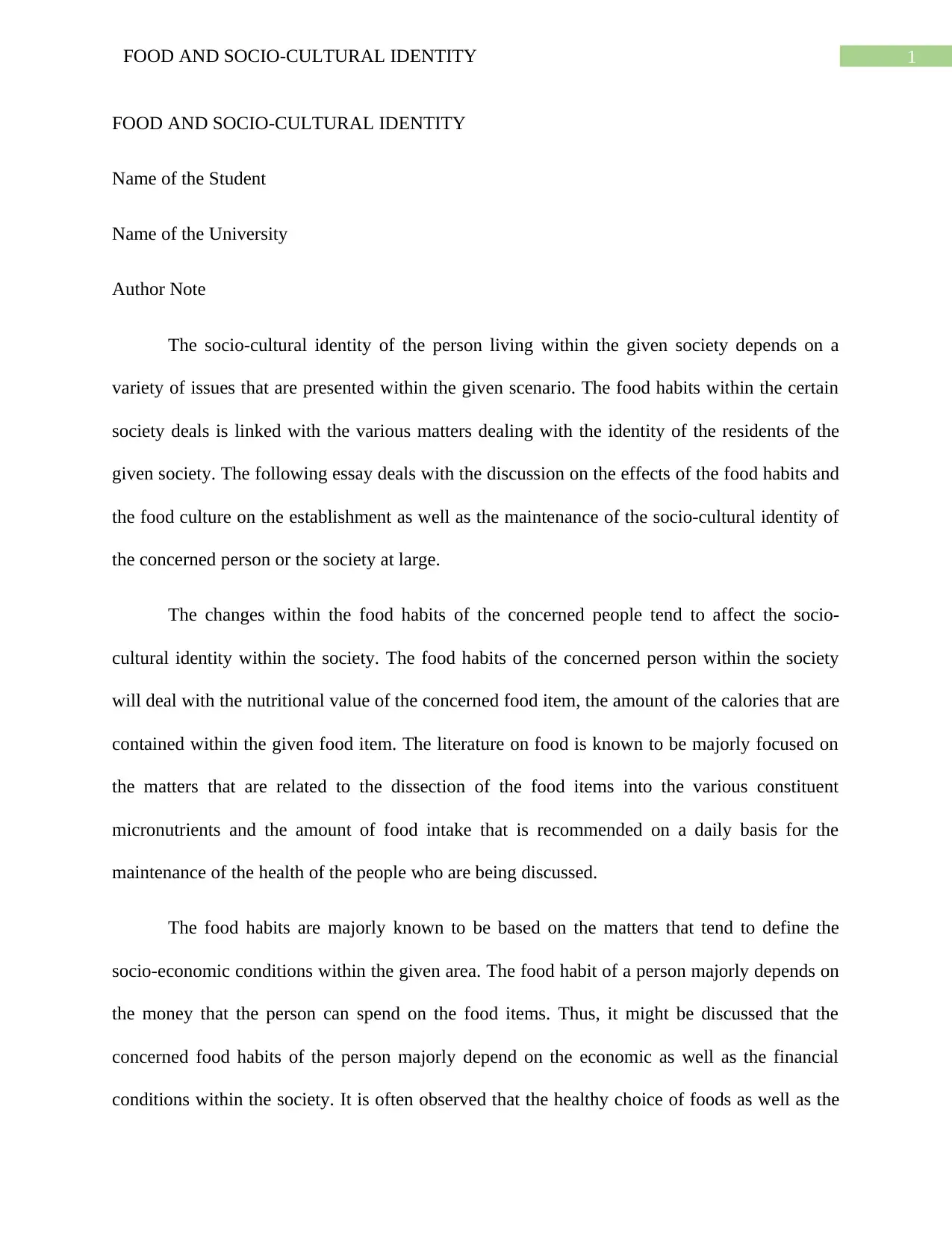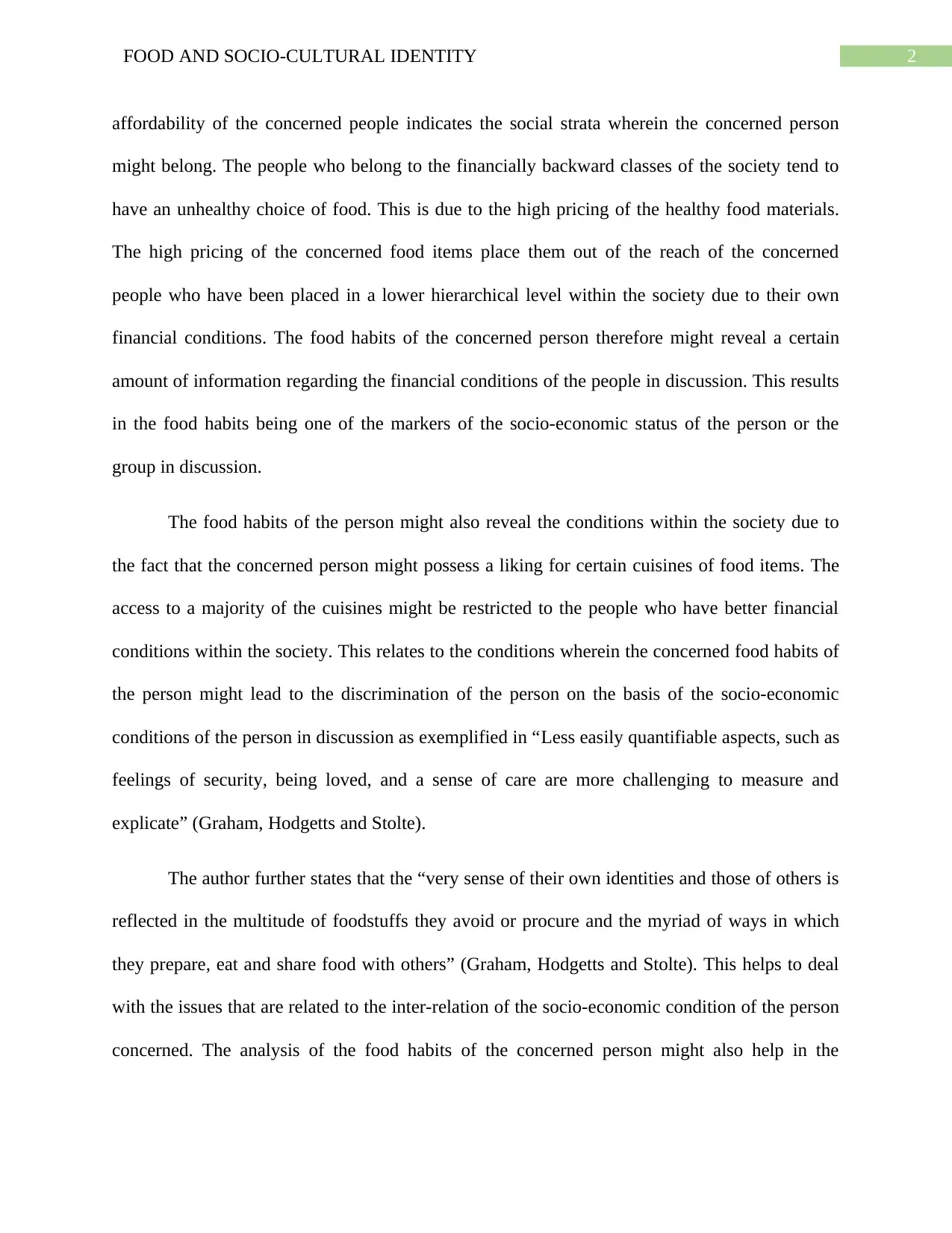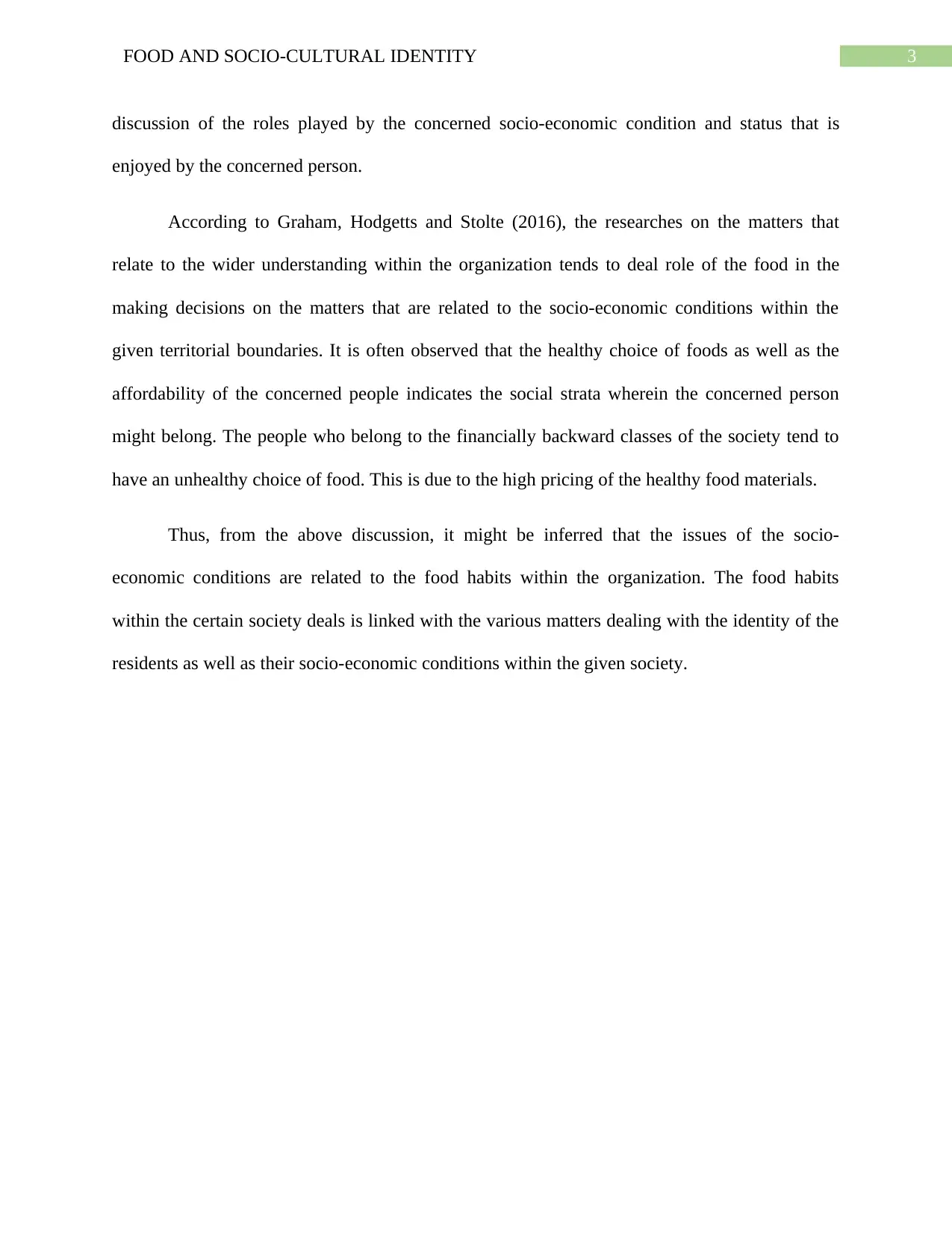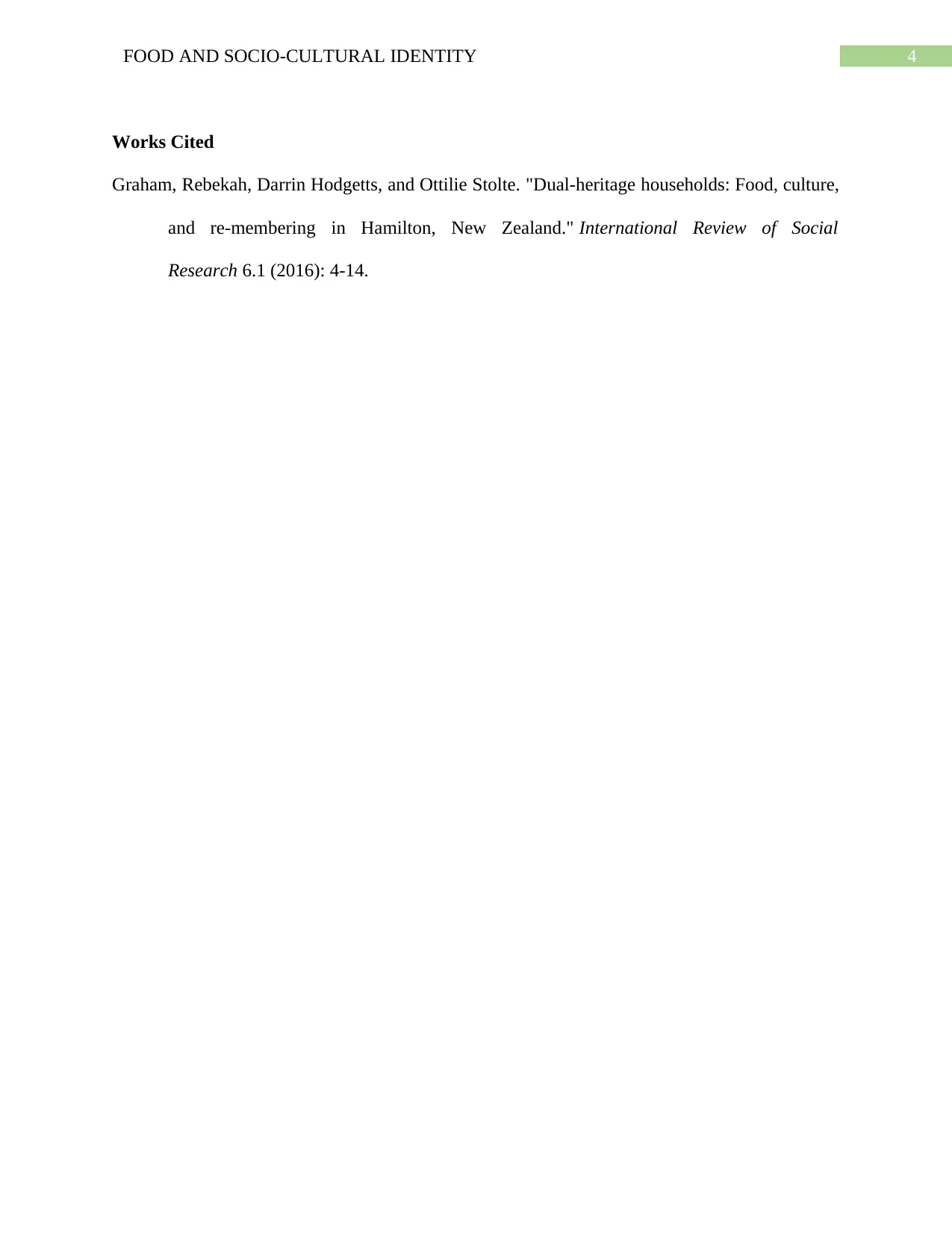Essay on the Relationship between Food and Socio-Cultural Identity
VerifiedAdded on 2021/09/12
|4
|913
|63
Essay
AI Summary
This essay examines the intricate relationship between food habits and socio-cultural identity. It explores how dietary choices are influenced by socioeconomic conditions and, in turn, how they shape an individual's social standing and cultural identity. The essay highlights that food habits reveal information about a person's financial status, social class, and cultural background, and also discusses how access to certain cuisines and food choices can lead to social discrimination. The author references Graham, Hodgetts, and Stolte's research to support the argument that food plays a significant role in decision-making within a society and is a marker of socio-economic status. The essay concludes by reinforcing the link between food habits and the establishment and maintenance of socio-cultural identity within a society.

1FOOD AND SOCIO-CULTURAL IDENTITY
FOOD AND SOCIO-CULTURAL IDENTITY
Name of the Student
Name of the University
Author Note
The socio-cultural identity of the person living within the given society depends on a
variety of issues that are presented within the given scenario. The food habits within the certain
society deals is linked with the various matters dealing with the identity of the residents of the
given society. The following essay deals with the discussion on the effects of the food habits and
the food culture on the establishment as well as the maintenance of the socio-cultural identity of
the concerned person or the society at large.
The changes within the food habits of the concerned people tend to affect the socio-
cultural identity within the society. The food habits of the concerned person within the society
will deal with the nutritional value of the concerned food item, the amount of the calories that are
contained within the given food item. The literature on food is known to be majorly focused on
the matters that are related to the dissection of the food items into the various constituent
micronutrients and the amount of food intake that is recommended on a daily basis for the
maintenance of the health of the people who are being discussed.
The food habits are majorly known to be based on the matters that tend to define the
socio-economic conditions within the given area. The food habit of a person majorly depends on
the money that the person can spend on the food items. Thus, it might be discussed that the
concerned food habits of the person majorly depend on the economic as well as the financial
conditions within the society. It is often observed that the healthy choice of foods as well as the
FOOD AND SOCIO-CULTURAL IDENTITY
Name of the Student
Name of the University
Author Note
The socio-cultural identity of the person living within the given society depends on a
variety of issues that are presented within the given scenario. The food habits within the certain
society deals is linked with the various matters dealing with the identity of the residents of the
given society. The following essay deals with the discussion on the effects of the food habits and
the food culture on the establishment as well as the maintenance of the socio-cultural identity of
the concerned person or the society at large.
The changes within the food habits of the concerned people tend to affect the socio-
cultural identity within the society. The food habits of the concerned person within the society
will deal with the nutritional value of the concerned food item, the amount of the calories that are
contained within the given food item. The literature on food is known to be majorly focused on
the matters that are related to the dissection of the food items into the various constituent
micronutrients and the amount of food intake that is recommended on a daily basis for the
maintenance of the health of the people who are being discussed.
The food habits are majorly known to be based on the matters that tend to define the
socio-economic conditions within the given area. The food habit of a person majorly depends on
the money that the person can spend on the food items. Thus, it might be discussed that the
concerned food habits of the person majorly depend on the economic as well as the financial
conditions within the society. It is often observed that the healthy choice of foods as well as the
Paraphrase This Document
Need a fresh take? Get an instant paraphrase of this document with our AI Paraphraser

2FOOD AND SOCIO-CULTURAL IDENTITY
affordability of the concerned people indicates the social strata wherein the concerned person
might belong. The people who belong to the financially backward classes of the society tend to
have an unhealthy choice of food. This is due to the high pricing of the healthy food materials.
The high pricing of the concerned food items place them out of the reach of the concerned
people who have been placed in a lower hierarchical level within the society due to their own
financial conditions. The food habits of the concerned person therefore might reveal a certain
amount of information regarding the financial conditions of the people in discussion. This results
in the food habits being one of the markers of the socio-economic status of the person or the
group in discussion.
The food habits of the person might also reveal the conditions within the society due to
the fact that the concerned person might possess a liking for certain cuisines of food items. The
access to a majority of the cuisines might be restricted to the people who have better financial
conditions within the society. This relates to the conditions wherein the concerned food habits of
the person might lead to the discrimination of the person on the basis of the socio-economic
conditions of the person in discussion as exemplified in “Less easily quantifiable aspects, such as
feelings of security, being loved, and a sense of care are more challenging to measure and
explicate” (Graham, Hodgetts and Stolte).
The author further states that the “very sense of their own identities and those of others is
reflected in the multitude of foodstuffs they avoid or procure and the myriad of ways in which
they prepare, eat and share food with others” (Graham, Hodgetts and Stolte). This helps to deal
with the issues that are related to the inter-relation of the socio-economic condition of the person
concerned. The analysis of the food habits of the concerned person might also help in the
affordability of the concerned people indicates the social strata wherein the concerned person
might belong. The people who belong to the financially backward classes of the society tend to
have an unhealthy choice of food. This is due to the high pricing of the healthy food materials.
The high pricing of the concerned food items place them out of the reach of the concerned
people who have been placed in a lower hierarchical level within the society due to their own
financial conditions. The food habits of the concerned person therefore might reveal a certain
amount of information regarding the financial conditions of the people in discussion. This results
in the food habits being one of the markers of the socio-economic status of the person or the
group in discussion.
The food habits of the person might also reveal the conditions within the society due to
the fact that the concerned person might possess a liking for certain cuisines of food items. The
access to a majority of the cuisines might be restricted to the people who have better financial
conditions within the society. This relates to the conditions wherein the concerned food habits of
the person might lead to the discrimination of the person on the basis of the socio-economic
conditions of the person in discussion as exemplified in “Less easily quantifiable aspects, such as
feelings of security, being loved, and a sense of care are more challenging to measure and
explicate” (Graham, Hodgetts and Stolte).
The author further states that the “very sense of their own identities and those of others is
reflected in the multitude of foodstuffs they avoid or procure and the myriad of ways in which
they prepare, eat and share food with others” (Graham, Hodgetts and Stolte). This helps to deal
with the issues that are related to the inter-relation of the socio-economic condition of the person
concerned. The analysis of the food habits of the concerned person might also help in the

3FOOD AND SOCIO-CULTURAL IDENTITY
discussion of the roles played by the concerned socio-economic condition and status that is
enjoyed by the concerned person.
According to Graham, Hodgetts and Stolte (2016), the researches on the matters that
relate to the wider understanding within the organization tends to deal role of the food in the
making decisions on the matters that are related to the socio-economic conditions within the
given territorial boundaries. It is often observed that the healthy choice of foods as well as the
affordability of the concerned people indicates the social strata wherein the concerned person
might belong. The people who belong to the financially backward classes of the society tend to
have an unhealthy choice of food. This is due to the high pricing of the healthy food materials.
Thus, from the above discussion, it might be inferred that the issues of the socio-
economic conditions are related to the food habits within the organization. The food habits
within the certain society deals is linked with the various matters dealing with the identity of the
residents as well as their socio-economic conditions within the given society.
discussion of the roles played by the concerned socio-economic condition and status that is
enjoyed by the concerned person.
According to Graham, Hodgetts and Stolte (2016), the researches on the matters that
relate to the wider understanding within the organization tends to deal role of the food in the
making decisions on the matters that are related to the socio-economic conditions within the
given territorial boundaries. It is often observed that the healthy choice of foods as well as the
affordability of the concerned people indicates the social strata wherein the concerned person
might belong. The people who belong to the financially backward classes of the society tend to
have an unhealthy choice of food. This is due to the high pricing of the healthy food materials.
Thus, from the above discussion, it might be inferred that the issues of the socio-
economic conditions are related to the food habits within the organization. The food habits
within the certain society deals is linked with the various matters dealing with the identity of the
residents as well as their socio-economic conditions within the given society.
⊘ This is a preview!⊘
Do you want full access?
Subscribe today to unlock all pages.

Trusted by 1+ million students worldwide

4FOOD AND SOCIO-CULTURAL IDENTITY
Works Cited
Graham, Rebekah, Darrin Hodgetts, and Ottilie Stolte. "Dual-heritage households: Food, culture,
and re-membering in Hamilton, New Zealand." International Review of Social
Research 6.1 (2016): 4-14.
Works Cited
Graham, Rebekah, Darrin Hodgetts, and Ottilie Stolte. "Dual-heritage households: Food, culture,
and re-membering in Hamilton, New Zealand." International Review of Social
Research 6.1 (2016): 4-14.
1 out of 4
Related Documents
Your All-in-One AI-Powered Toolkit for Academic Success.
+13062052269
info@desklib.com
Available 24*7 on WhatsApp / Email
![[object Object]](/_next/static/media/star-bottom.7253800d.svg)
Unlock your academic potential
Copyright © 2020–2026 A2Z Services. All Rights Reserved. Developed and managed by ZUCOL.





